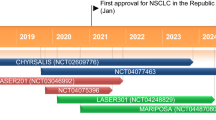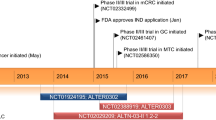Abstract
ZD1839 (‘lressa’)1,2 is an orally active, selective epidermal growth factor receptor-tyrosine kinase inhibitor which blocks signal transduction pathways implicated in the proliferation and survival of cancer cells and other host-dependent processes promoting cancer growth. In preclinical studies, ZD1839 produced reversible growth inhibition and growth delay in a wide range of tumour cell lines and human tumour xenografts. Moreover, this activity was enhanced when ZD1839 was coadministered with cytotoxic agents. Preliminary results from phase I trials in patients with advanced disease and a wide variety of tumour types suggest that ZD1839 has an acceptable tolerability profile and promising clinical efficacy, particularly in non-small cell lung cancer (NSCLC). ZD1839 is currently in phase III clinical development for the treatment of advanced NSCLC. In addition, further trials are ongoing or planned in a number of other tumour types.




Similar content being viewed by others
Notes
‘Iressa’ is a trademark of the AstraZeneca group of companies.
Use of a trade name is for product identification purposes only, and does not imply endorsement.
References
Olayioye MA, Neve RM, Lane HA, et al. The ErbB signaling network: receptor heterodimerization in development and cancer. EMBO J 2000; 19: 3159–67
Lemmon MA, Schlessinger J. Regulation of signal transduction and signal diversity by receptor oligomerization. Trends Biochem Sci 1994; 19: 459–63
Favoni RE, de Cupis A. The role of polypeptide growth factors in human carcinomas; new targets for a novel pharmacological approach. Pharmacol Rev 2000; 52: 179–206
Aaronson SA. Growth factors and cancer. Science 1991; 254: 1146–53
Wells A. EGF receptor. Int J Biochem Cell Biol 1999; 31: 637–43
Woodburn JR. The epidermal growth factor receptor and its inhibition in cancer therapy. Pharmacol Ther 1999; 82 (2–3): 241–50
Salomon DS, Brandt R, Ciardiello F, et al. Epidermal growth factor-related peptides and their receptors in human malignancies. Crit Rev Oncol Hematol 1995; 19: 183–232
Voldborg BR, Damstrup L, Spang-Thomsen M, et al. Epidermal growth factor receptor (EGFR) and EGFR mutations, function and possible role in clinical trials. Ann Oncol 1997; 8: 1197–206
Batra SK, Castelino Prabhu S, Wikstrand CJ, et al. Epidermal growth factor ligand-independent, unregulated, cell-transforming potential of a naturally occurring human mutant EGFRvIII gene. Cell Growth Differ 1995; 6(10): 1251–9
Chu CT, Everiss KD, Wikstrand CJ, et al. Receptor dimerization is not a factor in the signalling activity of a transforming variant epidermal growth factor receptor (EGFRvIII). Biochem J 1997; 324 (Pt 3): 855–61
Pawson T. Tyrosine kinases and their interactions with signalling proteins. Curr Opin Genet Dev 1992; 2: 4–12
Woodburn J, Kendrew J, Fennell M, et al. ZD1839 (‘Iressa’) a selective epidermal growth factor receptor tyrosine kinase inhibitor (EGFR-TKI): inhibition of c-fos mRNA, an intermediate marker of EGFR activation, correlates with tumor growth inhibition [abstract no. 2552]. Presented at the American Association of Cancer Research: 2000 Apr 1–5; San Francisco, USA. Proc Amer Assoc Cancer Res 2000; 41
Woodburn JR, Barker AJ, Wakeling AE, et al. 6-amino-4 (3-methyl-phenylamino)-quinazoline: an EGF receptor tyrosine kinase inhibitor with activity in a range of human tumour xenografts. Proc Am Assoc Cancer Res 1996; 36: 390–1
Budillon A, Di Gennaro E, Barbarino M, et al. ZD1839, an epidermal growth factor receptor tyrosine kinase inhibitor, upregulates p27KiP1 inducing G1 arrest and enhancing the antitumor effect of Interferon a [abstract no. 4910]. Presented at the American Association of Cancer Research: 2000 Apr 1–5; San Francisco, USA. Proc Amer Assoc Cancer Res 2000; 41
Lane HA, Beuvink I, Motoyama AB, et al. ErbB2 potentiates breast tumor proliferation through modulation of p27Kip1-CdK2 complex formation: receptor overexpression does not determine growth dependency. Mol Cell Biol 2000: 20: 3210–23
Ciardiello F, Caputo R, Bianco R, et al. Antitumor effect and potentiation of cytotoxic drugs activity in human cancer cells by ZD-1839 (Iressa), an epidermal growth factor receptor-selective tyrosine kinase inhibitor. Clin Cancer Res 2000; 6: 2053–63
Cullinane C, Kleinschmidt M, Webster LK. Antitumour activity of ZD1839 (‘Iressa’) in combination with cisplatin in NIH3T3 cells expressing human epidermal growth factor receptor [abstract no. 3073]. Presented at the American Association of Cancer Research: 2000 Apr 1–5; San Francisco, USA. Proc Amer Assoc Cancer Res 2000; 41
Sirotnak FM, Zakowsky MF, Miller VA, et al. Potentiation of cytotoxic agents against human tumors in mice by ZD1839 (Iressa™), an inhibitor of EGFR tyrosine kinase, does not require high levels of expression of EGFR [abstractno. 3076]. Presented at the American Association of Cancer Research: 2000 Apr 1–5; San Francisco, USA. Proc Amer Assoc Cancer Res 2000; 41
Chan KC, Knox F, Woodburn JR, et al. EGFR tyrosine kinase inhibition decreases epithelial proliferation in DCIS of the breast, whereas c-erbB2 blockade does not [abstract no. 3074]. Presented at the American Association of Cancer Research: 2000 Apr 1–5; San Francisco, USA. Proc Amer Assoc Cancer Res 2000; 41
Kelly HC, Laight A, Morris CQ, et al. Phase I data of ZD 1839-an oral epidermal growth factor receptor tyrosine kinase inhibitor [abstract no 419]. Ann Oncol 1998; 2: 109
Kelly HC, Ferry D, Hammond L, et al. ZD1839 (‘Iressa’), an oral EGFR-TKI (epidermal growth factor tyrosine kinase inhibitor): pharmacokinetics in a Phase I study of patients with advanced cancer [abstract no. 3896]. Presented at the American Association of Cancer Research: 2000 Apr 1–5; San Francisco, USA. Proc Amer Assoc Cancer Res 2000; 41
Goss G, Hirte H, Batist G, et al. NCIC CTG IND.122: a two-part Phase I pharmacokinetic (PK) and pharmacodynamic (PD) study of the epidermal growth factor receptor tyrosine kinase inhibitor (EGFR-TKI) ZD1839 [abstract no 880]. Proc Am Soc Clin Oncol 2000; 19: 225a
Baselga J, Herbst R, LoRusso P, et al. Continuous administration of ZD1839 (Iressa), a novel oral epidermal growth factor receptor tyrosine kinase inhibitor (EGFR-TKI), in patients with five selected tumor types: evidence of activity and good tolerability [abstract no 686]. Proc Am Soc Clin Oncol 2000; 19: 177a
Nakagawa K, Yamamoto N, Kudoh S, et al. A Phase I intermittent dose-escalation trial of ZD1839 (Iressa) in Japanese patients with solid malignant tumours [abstract no 711]. Proc Am Soc Clin Oncol 2000; 19: 183a
Ferry D, Hammond L, Ranson M, et al. Intermittent oral ZD1839 (Iressa), a novel epidermal growth factor receptor tyrosine kinase inhibitor (EGFR-TKI), shows evidence of good tolerability and activity: final results from a Phase I study [abstract no 5E]. Proc Am Soc Clin Oncol 2000; 19: 3a
Shepherd FA. Chemotherapy for non-small cell lung cancer: have we reached a new plateau? Semin Oncol 1999; 26 (1 Suppl. 4): 3–11
Johnson DH. Evolution of cisplatin-based chemotherapy in non-small cell lung cancer: a historical perspective and the eastern cooperative oncology group experience. Chest 2000; 117 Suppl. 1: 133–7
Author information
Authors and Affiliations
Rights and permissions
About this article
Cite this article
Baselga, J., Averbuch, S.D. ZD1839 (‘Iressa’)1,2 as an Anticancer Agent. Drugs 60 (Suppl 1), 33–40 (2000). https://doi.org/10.2165/00003495-200060001-00004
Published:
Issue Date:
DOI: https://doi.org/10.2165/00003495-200060001-00004




